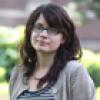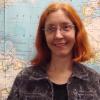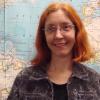by Saraya Brewer
photos by Richie Wireman
Like many graduate students, University of Kentucky English Ph.D. candidate Sarah Schuetze lights up when she talks about her research. That in and of itself is not particularly strange – what’s perhaps a bit unusual about it is that her focus of study is rather dark, at times bordering morbidity. Schuetze’s academic concentration is disease – the culture of hysteria surrounding it, and the various ways it has affected characters’ lives in American literary texts throughout history.
She admits that it’s a bit odd, but she’s okay with that.
“I’m really attracted to things that are sort of peculiar,” she said. “I try to study things that are interesting and weird, because that’s what attracts me to a book.”
To that end,


















